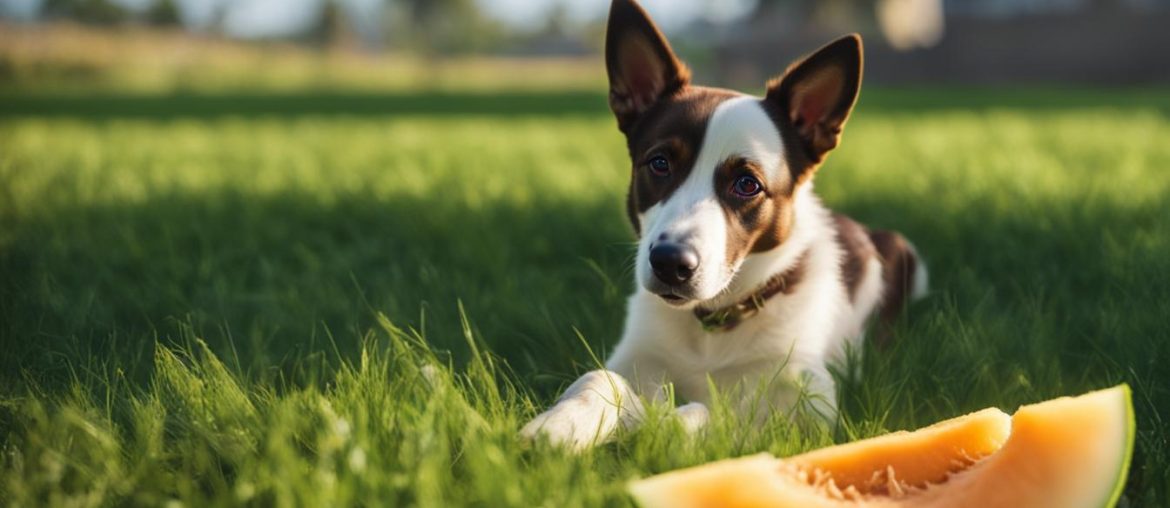As a dog owner, it’s natural to wonder if your furry friend can enjoy the same fruits you do. One fruit that may catch your attention is cantaloupe. But can dogs have cantaloupe? Let’s explore the topic in detail and find out.
Dogs can eat cantaloupe in moderation, and it can be a healthy alternative to traditional treats.
Cantaloupe is not only delicious but also rich in nutrients. It is low in calories and high in water content, making it a good option for rehydration. This fruit contains vitamins B6, A, and C, niacin, folate, and potassium, which provide numerous health benefits for dogs.
However, it’s important to feed cantaloupe in moderation and take precautions to ensure your dog’s safety. Removing the seeds and rind is crucial to avoid choking hazards and gastrointestinal upset.
Key Takeaways:
- Dogs can eat cantaloupe in moderation as a healthy alternative to treats.
- Cantaloupe is low in calories and high in water content, making it hydrating.
- It contains vitamins B6, A, and C, niacin, folate, and potassium.
- Remove the seeds and rind to prevent choking hazards and gastrointestinal upset.
- Consult with a veterinarian if you have concerns about feeding cantaloupe to your dog.
Is Cantaloupe Safe for Dogs?

Cantaloupe is a safe and healthy fruit option for dogs when fed in moderation. It contains essential vitamins and nutrients that can benefit your furry friend. However, there are a few important considerations to keep in mind to ensure the safety of your dog when feeding them cantaloupe.
Firstly, while cantaloupe seeds are safe for dogs to consume, they can pose a choking hazard. It is best to remove the seeds before serving the cantaloupe to your dog. Additionally, the rind of the cantaloupe can cause gastrointestinal upset and should be avoided.
Feeding cantaloupe to your dog in appropriate portion sizes is crucial. While cantaloupe is low in calories, it does contain natural sugars that, if consumed in excess, can contribute to obesity. Consult with your veterinarian to determine the right amount of cantaloupe to include in your dog’s diet based on their size, age, and overall health.
Table: Safe Amounts of Cantaloupe for Dogs
| Dog Size | Safe Amount of Cantaloupe |
|---|---|
| Extra-Small Dogs (e.g., Chihuahua, Yorkshire Terrier) | 1 or 2 small pieces |
| Small Dogs (e.g., Shih Tzu, Maltese) | Up to 3 pieces |
| Medium Dogs (e.g., Beagle, Cocker Spaniel) | Up to 5 pieces |
| Large Dogs (e.g., Labrador Retriever, German Shepherd) | Up to 6 pieces |
| Extra-Large Dogs (e.g., Great Dane, Saint Bernard) | A handful of pieces |
“Feeding cantaloupe to your dog in appropriate portion sizes is crucial.”
It is always recommended to monitor your dog’s reaction to any new food, including cantaloupe. If you notice any unusual symptoms such as vomiting, diarrhea, or allergic reactions, discontinue feeding cantaloupe and consult with your veterinarian.
Remember, while cantaloupe can be a tasty and healthy treat for your dog, it should not replace their regular balanced diet. Use cantaloupe as an occasional addition or reward, and ensure it makes up only a small portion of their overall food intake.
Benefits of Cantaloupe for Dogs
Cantaloupe offers numerous benefits for dogs due to its rich nutritional profile. Here are some of the key advantages:
Nutrient-rich:
Cantaloupe is packed with essential nutrients that promote overall health in dogs. It contains vitamins A and C, which support a strong immune system and help maintain healthy skin and coat. The presence of niacin and folate aids in proper cell function and growth. Additionally, cantaloupe is an excellent source of dietary fiber, which aids in digestion and helps prevent constipation.
Hydration:
Cantaloupe has a high water content, making it a hydrating snack for dogs, especially during hot weather or after physical activity. Adequate hydration is crucial for dogs to maintain optimal health and prevent issues like overheating and dehydration.
Antioxidants:
Cantaloupe is rich in antioxidants, such as vitamins A and C. These antioxidants help combat free radicals in the body, reducing the risk of cell damage and certain diseases. The presence of antioxidants in cantaloupe can contribute to the overall well-being and longevity of dogs.
| Nutrient | Quantity per 100g |
|---|---|
| Vitamin A | 338 micrograms |
| Vitamin C | 36.7 milligrams |
| Niacin | 0.734 milligrams |
| Folate | 21 micrograms |
| Potassium | 267 milligrams |
Remember to always feed cantaloupe to your dog in moderation and consult with a veterinarian if you have any concerns or specific dietary considerations.
Risks of Feeding Cantaloupe to Dogs
Feeding cantaloupe to dogs comes with certain risks that need to be taken into consideration. While cantaloupe is generally safe for canine consumption, there are a few potential health hazards to be aware of.
Choking Hazards and Gastrointestinal Upset
One risk of feeding cantaloupe to dogs is the potential for choking. The seeds and rind can pose a choking hazard, so it is important to remove them before serving. Additionally, the rind, similar to watermelon rind, can cause gastrointestinal upset if ingested. It is best to only feed the flesh of the cantaloupe to your dog to avoid any digestive issues.
Potential for Gastrointestinal Impaction
The tough, fibrous rind of the cantaloupe can also lead to gastrointestinal impaction. If ingested in large quantities, especially by smaller dogs, the rind may cause blockages in the digestive tract. This can be a serious health issue that may require veterinary intervention. To prevent this risk, always ensure that your dog only consumes the fleshy part of the cantaloupe.
Risk of Obesity
Cantaloupe, like all fruits, contains sugar. Feeding too much cantaloupe to your dog, along with a regular diet, can contribute to obesity. It is important to feed cantaloupe in moderation and consider it as an occasional treat rather than a staple food. Monitoring your dog’s overall calorie intake is crucial for maintaining a healthy weight.
| Risks of Feeding Cantaloupe to Dogs | Precautions |
|---|---|
| Choking Hazards and Gastrointestinal Upset | Remove the seeds and rind before serving. |
| Potential for Gastrointestinal Impaction | Feed only the flesh of the cantaloupe to your dog. |
| Risk of Obesity | Feed cantaloupe in moderation and consider it as an occasional treat. |
Feeding Cantaloupe to Puppies

Puppies can enjoy the delicious taste and health benefits of cantaloupe, but it is important to introduce this fruit to their diet gradually and in moderation. Puppies have sensitive digestive systems, and sudden changes in their diet can lead to gastrointestinal upset. Therefore, it is advisable to start with small portions of cantaloupe and closely monitor their reactions.
Cantaloupe can be a nutritious addition to a puppy’s diet, as it is packed with essential vitamins and minerals. However, it is crucial to remember that puppies have different nutritional needs compared to adult dogs. Therefore, the portion size should be adjusted based on their weight and age.
As with any new food, if your puppy experiences any symptoms of digestive distress, such as diarrhea or vomiting, it is important to consult with a veterinarian. They can provide guidance on the appropriate amount of cantaloupe to feed your puppy and ensure that they are receiving a balanced diet.
The following table provides a guideline for feeding cantaloupe to puppies:
| Puppy Size | Cantaloupe Portion |
|---|---|
| Extra-Small | 1-2 small pieces |
| Small | Up to 3 pieces |
| Medium | Up to 5 pieces |
| Large | Up to 6 pieces |
| Extra-Large | A handful of pieces |
Please note that the portion sizes mentioned in the table are general guidelines. Always take into consideration the individual characteristics and needs of your puppy when determining the appropriate serving size of cantaloupe.
Remember that cantaloupe should only make up a small portion of your puppy’s overall diet. It should be offered as a treat or supplement to their regular puppy food.
By following these guidelines and monitoring your puppy’s well-being, you can safely incorporate cantaloupe into their diet and provide them with a tasty and nutritious treat.
Serving Cantaloupe to Dogs

When it comes to serving cantaloupe to dogs, there are a few important considerations to keep in mind. By following these guidelines, you can ensure that your furry friend enjoys this tasty treat safely and in moderation.
Removing the Seeds and Rind
First and foremost, it is crucial to remove the seeds and rind from the cantaloupe before serving it to your dog. The seeds can be a choking hazard, and the tough rind can cause gastrointestinal upset. By taking the time to prepare the cantaloupe properly, you can eliminate these potential risks and ensure your dog’s safety.
Cutting into Bite-Size Pieces
After removing the seeds and rind, it’s best to cut the cantaloupe into bite-size pieces that are easy for your dog to eat. This will help prevent choking and make it more manageable for them to enjoy. Remember, moderation is key, so be mindful of the portion size you’re offering.
Feeding in Moderation
Cantaloupe should only make up a small portion of your dog’s overall diet. While it offers many health benefits, too much of a good thing can lead to problems such as obesity due to its high sugar content. As a responsible pet owner, it’s important to keep an eye on the quantity of cantaloupe you’re feeding your dog and ensure it remains balanced with their regular meals.
Monitoring Your Dog’s Reaction
Lastly, always monitor your dog’s reaction to new foods, including cantaloupe. While it is generally safe for dogs, individual sensitivities and allergies can vary. If you notice any abnormal signs or symptoms after feeding cantaloupe to your dog, it’s best to consult with a veterinarian for further guidance.
In summary, serving cantaloupe to your dog can be a healthy and refreshing treat. By removing the seeds and rind, cutting it into bite-size pieces, feeding in moderation, and monitoring your dog’s reaction, you can ensure a safe and enjoyable experience for your furry friend.
Can Dogs Eat Other Melons?

Aside from cantaloupe, dogs can safely consume other melons such as watermelon and honeydew melon. These melons provide similar benefits to cantaloupe and can serve as a refreshing and nutritious addition to your dog’s diet.
Watermelon is hydrating and contains vitamins A and C, which are important for your dog’s overall health. It is also a great source of dietary fiber. However, it’s crucial to remove the seeds and rind before feeding watermelon to your dog to prevent choking hazards and gastrointestinal issues.
Honeydew melon, on the other hand, is low in calories and has a high water content, making it a healthy choice for dogs. It also contains vitamins A and C, as well as potassium. As with watermelon, be sure to remove the seeds and rind before serving honeydew melon to your furry friend.
Table: A Comparison of Melons for Dogs
| Melon | Nutritional Benefits | Precautions |
|---|---|---|
| Watermelon | Hydrating, rich in vitamins A and C, and a good source of dietary fiber. | Remove seeds and rind to prevent choking hazards and gastrointestinal issues. |
| Honeydew Melon | Low in calories, high in water content, contains vitamins A and C, and potassium. | Remove seeds and rind to prevent choking hazards and gastrointestinal issues. |
When introducing watermelon or honeydew melon to your dog, start with small portions to ensure they tolerate it well. Monitor their reaction and look out for any signs of discomfort or digestive issues. If your dog has any existing health conditions or dietary restrictions, it’s always a good idea to consult with your veterinarian before incorporating new foods into their diet.
Alternative Ways to Serve Cantaloupe to Dogs

When it comes to serving cantaloupe to your furry friend, there are several creative and delicious alternatives that you can try. These methods can add variety to your dog’s diet and make it even more enjoyable for them to snack on this nutritious fruit. Here are a few alternative ways to serve cantaloupe to dogs:
Making Frozen Cantaloupe Treats
An excellent way to serve cantaloupe to dogs, especially during hot summer days, is by making frozen cantaloupe treats. Simply cut the cantaloupe into small, bite-sized pieces and place them in a freezer-safe container. Freeze the cantaloupe chunks until they solidify, and then you have a refreshing and cooling treat ready for your furry friend. These frozen cantaloupe treats not only provide relief from the heat but also offer a tasty and healthy snack option for your dog.
Creating Cantaloupe Dog Treats
If you prefer to have a more long-lasting and portable option, you can create homemade cantaloupe dog treats. There are various recipes available online that combine cantaloupe with other dog-safe ingredients, such as peanut butter or yogurt, to make flavorful and nutritious treats. These treats can be baked or dehydrated, depending on your preference and the resources available to you. Just make sure to follow the recipe carefully and avoid using any ingredients that may be harmful to dogs, such as xylitol.
Blending Cantaloupe with Other Fruits
If your dog enjoys fruit blends, consider blending cantaloupe with other dog-safe fruits to create a tasty and nutritious mixture. Fruits like strawberries, blueberries, and apples can complement the natural sweetness of cantaloupe and create a flavorful combination. Ensure that all fruits used are safe for dogs and remove any seeds or cores before blending. You can serve this fruity blend as a standalone treat or as a food topper to add extra flavor to your dog’s regular meals.
How Much Cantaloupe is Safe for Dogs?

When it comes to feeding cantaloupe to our furry friends, it’s important to consider the appropriate portion sizes. The amount of cantaloupe that is safe for dogs to consume depends on their size. As a general guideline, extra-small dogs can have one or two small pieces, small dogs can have up to three pieces, medium dogs can have up to five pieces, large dogs can have up to six pieces, and extra-large dogs can have a handful of pieces.
It’s crucial to remember that cantaloupe should only make up a small portion of your dog’s overall diet. While cantaloupe provides several health benefits, including hydration and essential nutrients, it’s essential to feed it in moderation. Too much cantaloupe, along with their regular diet, can contribute to obesity in dogs due to its high sugar content. Monitoring their intake and adjusting portion sizes accordingly is key to ensuring their safety and well-being.
By feeding cantaloupe in moderation and adhering to the appropriate portion sizes based on your dog’s size, you can safely incorporate this delicious fruit into their diet. Remember to always remove the seeds and rind to prevent choking hazards and gastrointestinal issues. If you have any concerns or questions about feeding cantaloupe to your dog, it’s best to consult with a veterinarian for personalized advice.
Wrapping Up
To summarize, dogs can indeed have cantaloupe as part of their diet. It can be a healthy and nutritious treat when served in moderation. Cantaloupe is low in calories and packed with essential vitamins and minerals that can benefit dogs’ overall health.
However, it is important to remember certain precautions when feeding cantaloupe to dogs. Always remove the seeds and rind, as they can pose choking hazards and may cause gastrointestinal issues. Additionally, portion control is crucial to prevent any adverse effects, especially considering the fruit’s sugar content.
To ensure the safety and well-being of your dog, it is recommended to consult with a veterinarian before introducing cantaloupe or any new food into their diet. They can provide personalized guidance based on your dog’s specific needs and health condition.
Remember, dogs and cantaloupe can go hand in hand, but responsible feeding practices, along with a well-balanced diet, should always be a priority when it comes to providing the best care for your furry friend.
FAQ
Is cantaloupe safe for dogs to eat?
Yes, dogs can safely eat cantaloupe in moderation.
Can dogs eat cantaloupe seeds?
Yes, dogs can eat cantaloupe seeds, but it is best to remove them to prevent choking hazards.
What are the benefits of cantaloupe for dogs?
Cantaloupe is a good source of vitamins and nutrients, promoting healthy cell function and aiding digestion.
Are there any risks to feeding cantaloupe to dogs?
Cantaloupe rinds can cause gastrointestinal upset, and too much cantaloupe can contribute to obesity in dogs.
Can puppies eat cantaloupe?
Yes, puppies can eat cantaloupe in moderation, but it is important to introduce new foods gradually and monitor their reactions.
How should I serve cantaloupe to my dog?
It is important to remove the seeds and rind and cut the cantaloupe into bite-size pieces before serving it to your dog.
Can dogs eat other melons?
Yes, dogs can also safely consume other melons like watermelon and honeydew melon.
What are some alternative ways to serve cantaloupe to dogs?
You can freeze chunks of cantaloupe for a refreshing treat or mix mashed cantaloupe with their regular food.
How much cantaloupe is safe for dogs to eat?
The portion size depends on the dog’s size, but cantaloupe should only make up a small portion of their overall diet.
Should I consult with a veterinarian before feeding cantaloupe to my dog?
It is always best to consult with a veterinarian if you have any concerns or questions about feeding cantaloupe to your dog.






